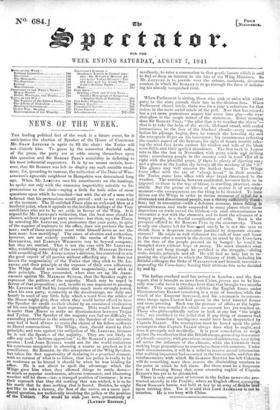NEWS OF THE WEEK.
TEE leading political fact of the week is a future event, for it anticipates the election of Speaker of the House of Commons. Mr. SHAW LEFEVRE is again to fill the chair : the Tories will • not disturb him. To guess by the somewhat doubtful reflex of the-- press, the party are at odds among themselves upon this question and Sir ROBERT PEEL'S amiability in deferring to his most influential supporters. It is by no means certain, how- ever, that Sir Roamer was left to display any such amiable weak- ness; for, according to rumour, the reelection of the Duke of WEL- LINGTON'S agreeable neighbour in Hampshire was determined long ago. When Mr. LEWEVRE met his constituents on the hustings, he spoke not only with the excessive impartiality suitable to his pretensions to the chair—saying a little for both sides of most lineations upon which he touched—but with the air of a man who believed that his pretensions would prevail : and so we remarked at the moment. The ill-satisfied Times aims an awkward blow at a tenderer point, when it appeals to the invidious feelings of the Tory candidates who are to be set aside in favour of the Whig. It is argued for Mr. LEFEVRE'S reelection, that the best man should be chosen, without regard to party motives : but then, says the Times, by selecting Mr. LEFEVRE, you pronounce that your party, in spite of the nistaber of aspirants to the office, does not produce the best man ; each of those aspirants must write himself down as not the best man: how mortifying! The cases of election and reelection, however, are not exactly parallel : the merits of the WYNNS, GOULBURNS, and EARDLEY WILMOTTS may be beyond compare ; but they are untried. That is not the case with Mr. LEFEVRE ; who' combining something of the suavity of Mr. MANNEas SUTTON with something of Mr. ABERCROMBY'S decision, has contrived to win the good report of all parties without offending any. It does not lessen the magnanimity of the Tories that they stick to Mr. LE- rsvas and their principle at the expense of their own adherents. The Whigs should now imitate that magnanimity, and stick to their principle. They contended, when they set up Mr. ABER.. CROMBY against Mr. MANNERS SUTTON, that the Speaker ought to represent the politics of the majority. Much may be urged in favour of that proposition ; and, to refer to one argument in passing, Mr. LEFEVRE will find his impartiality much more strongly tested, when his own party, constantly at the disadvantage, are daily and hourly in need of any little help which a word from the arbiter of the House might give, than when they could better afibrd to have -the Speaker do credit to their choice by an occasional vindication of his own impartiality at their expense. Dido would have found it easier than ./Eneas to make no discrimination between Trojan and Tyrian. The Speaker of the majority can feel no difficulty in extending protection to tfie minority; the Speaker of the minority may feel it hard always to resist the claims of his fellow-sufferers to liberal constructions. The Whigs, then, should stand by their principle, and vote against the reelection of Mr. LEFEVRE, because be is not the Speaker of the majbrity. They are not likely to • offer any such "factious opposition" to Sir ROBERT'S amiable con- 'cession: Lord Joins RUSSELL would not for the world embarrass his courteous antagonist in choosing a course as prudent as it is conciliatory. Sir ROBERT, by this acceptance of the Whig Speaker, has taken the first opportunity of declaring in a practical manner, with an earnest of what is to follow, that his policy is really to be as moderate as he hinted it should be when he was bidding for office. He is not about to spoil the advantage which the Whigs gave him when they allowed things to settle down— as much as popular restlessness, adverse commerce, and blustering weather will let them—into a tranquil position of inertness : it was their reproach that they did nothing that was wished, it is to be his merit that be does nothing that is feared. Besides, he might not like to take a victory, the first of the series, on a mere inci- dental question, not technically involving the policy or the position of the Cabinet. Nor would he wish just now, prematurely or needlessly, to raise a commotion in that gentle bosom which is said to feel so deep an interest in the fate of the Whig Ministers. So Mr. LEFEVRE is to preside over the urbane, moderate, decorous combat, in which Sir ROBERT is to go through the form of unhors- ing his already vanquished rival.


























